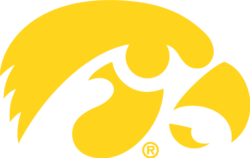MISSION
The University of Iowa Athletics Department and the Iowa Raptor Project (IRP), a program of the University of Iowa College of Education, are partnering on a joint wildlife conservation education initiative. This program will integrate Raptor Ambassadors, featuring native Red-tailed Hawks and Peregrine Falcons, into select University of Iowa athletic events. These appearances will generate messaging tied to the educational and research efforts of the Iowa Raptor Project (IRP). The IRP will be the caretakers and trainers for all the Raptor Ambassadors involved in the program. The health, safety, and security of the animals will be the primary focus at all times.
IOWA RAPTOR PROJECT
The IRP’s mission is to connect students and community to the conservation of birds of prey and their natural habitats through research and education. The IRP achieves its goal to preserve Iowa’s raptor populations and habitats through educational experiences that awaken awareness, nature appreciation, and inspire action, as well as through field research.
Ryan Anthony | Master Falconer | Director of Iowa Raptor Project
Dave Conrads | Director of UI WILD, College of Education
Holly Anthony | Master Falconer | Asst. Director Iowa Raptor Project
ATHLETIC APPEARANCES
The primary goal is to promote the nature conservation efforts led by the Iowa Raptor Project. The Iowa Athletics Department will coordinate the appearances, branding efforts, promotions, and communication for the program. The Raptor Ambassadors could also be featured in Hawkeye Athletics promotional materials, videos, and online to provide consistent exposure to the importance of conservation. The raptors are protected by the federal Migratory Bird Treaty Act (MBTA) and Iowa state laws. The raptor images will not be used to promote tickets or revenue generation, but can be used in gameday collateral such as introduction videos.
Hercules 2 | Female Red-tailed Hawk | Born: 6/1/2021
Hercules 3 | Male Red-tailed Hawk | Born: 6/3/2021
Walter | Male Harris's Hawk | June 2022
RAPTOR AMBASSADOR Q&A
Hercules II (born 6/1/2021) & III (born 6/3/2021) were captive-bred in Washington State.
These birds were purchased by the University of Iowa to conduct conservation education surrounding birds of prey and their habitats. Hercules II has an injured eye, but the birds are otherwise fully capable of flight and have no other injuries.
They will be trained to fly at our events by our Master Falconers at the Iowa Raptor Project. To provide the best care for the birds, the birds will not be flown when there is unnecessary risk involved. Examples of these risks include, but are not limited to: inclement weather, unusual behavior from the program birds, or other uncontrollable variables.
The training will consist of lots of rewards based on operant conditioning by highly experienced staff and volunteers. Birds are encouraged to express desirable natural behaviors through training. Only positive reinforcement is ever used to reinforce good behavior expressed by the birds; undesirable behaviors are simply ignored.
The Athletics Department will track the training process and share updates. The training will occur at Kinnick Stadium.
Her first-time mother accidentally stepped on her in the nest.
The raptors will live out at the Iowa Raptor Project. The IRP’s current location is at the University of Iowa’s Macbride Nature Recreation Area just north of Iowa City. The raptors will NOT be on general display to the general public.
The University of Iowa purchased the raptors.
The staff of the Iowa Raptor Project includes two master falconers who are on staff with UI. These two staff members and a wonderful team of volunteers and interns take care of the raptors.
The Raptor Ambassador Program currently has two red-tailed hawks and one peregrine falcon.
The Iowa Raptor Project, however, houses and exhibits 16 birds of prey at the Macbride Nature Recreation Area.
Yes. The plan is to have at least one raptor at each home game this year.
Make a donation to the Iowa Raptor Project.
For more information, visit the Iowa Raptor Project website.
All funds go towards providing husbandry and care to the birds at the Iowa Raptor Project or to promote conservation efforts for Iowa’s raptors. The Iowa Raptor Project is also looking to enhance the raptor enclosures, expand on research for birds of prey, and continue to promote nature conservation efforts through education and nature interpretation.
No. They are owned by the University and legally protected birds through various state and federal laws.
All raptors are protected by the federal Migratory Bird Treaty Act of 1918 (16 U.S.C. 703–712, MBTA). Raptors are further protected by Iowa State Laws (Iowa Code 2021, Section 481A.42). Peregrine Falcons are a species of special concern in Iowa and therefore provided some additional protections (571 IAC chapter 77.2: List of Animals).

%20--%3e%3csvg%20xmlns:inkpad='http://taptrix.com/inkpad/svg_extensions'%20height='231pt'%20xmlns:xlink='http://www.w3.org/1999/xlink'%20xmlns='http://www.w3.org/2000/svg'%20width='796pt'%20version='1.1'%20viewBox='0,0,796,231'%3e%3cdefs/%3e%3cg%20id='Untitled'%20inkpad:layerName='Untitled'%3e%3cpath%20d='M102.252+48.3067L83.5399+48.3067L83.5399+182.202L102.252+182.202L102.252+230.822L-0.0490809+230.822L-0.0490809+182.202L18.6626+182.202L18.6626+48.3067L-0.0490809+48.3067L-0.0490809+0.300613L102.252+0.300613L102.252+48.3067ZM239.828+230.822L165.748+230.822C138.908+230.822+121.27+213.184+121.27+184.35L121.27+46.773C121.27+18.092+139.215+0.300602+165.748+0.300602L239.828+0.300602C266.669+0.300602+284.307+18.2454+284.307+46.773L284.307+184.35C284.307+213.031+266.362+230.822+239.828+230.822ZM218.816+182.356L218.816+48.4601L186.607+48.4601L186.607+182.356L218.816+182.356ZM313.448+48.3067L297.037+48.3067L297.037+0.300613L394.123+0.300613L394.123+48.6135L375.718+48.6135L392.282+159.503L426.945+0.300613L476.025+0.300613L512.834+159.503L526.178+48.6135L509.307+48.6135L509.307+0.300613L605.166+0.300613L605.166+48.6135L589.368+48.6135L560.534+231.129L482.313+231.129L451.945+95.0859L420.963+230.822L345.81+230.822L313.448+48.3067ZM588.141+182.356L605.779+182.356L640.902+0.300613L745.656+0.300613L780.166+182.356L796.577+182.356L796.577+230.975L718.356+230.975L710.994+174.687L672.19+174.687L665.288+230.975L588.601+230.975L588.141+182.356L588.141+182.356ZM706.853+132.509L691.975+39.4111L676.638+132.509L706.853+132.509Z'%20opacity='1'%20fill='%23ffcd00'/%3e%3c/g%3e%3c/svg%3e)